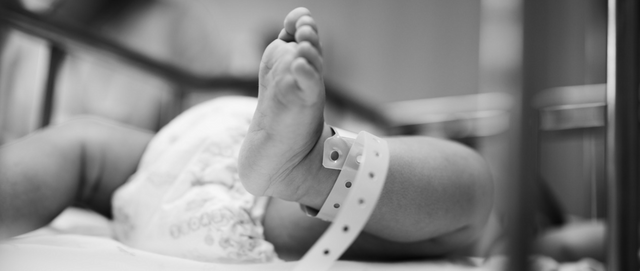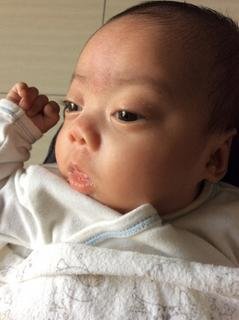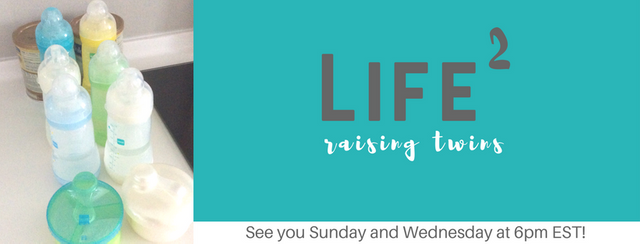Adoption & Attachment | How A Baby Handles Grief & Loss
Imagine for a moment that you are just beginning life. For nine months or so you grow and develop inside a warm, dark place. Your world is regulated by the rhythmic beating of a heart. Over time you begin to recognize a few voices and sounds, but one in particular is constant, a daily companion. Sometimes the beating heart races quickly, other times it slows and soothes you to sleep. Sometimes the voices are raised and animated. Other times they sound like the lapping of waves on a boat or the sweet singing of a bird.
One day you enter a strange place. Your world is suddenly bright and harsh. You cry out for that place where you were sheltered and warm. You listen for that heartbeat, that voice you came to rely on. But it's not there. Strange hands hold you. Their smell isn't comforting. You call out, but the rhythm, the warmth, the soothing lyrics are gone.

Perhaps the loss happens when they are older, but inevitably, it happens. For the adoptive family, the reality of their child's loss may not be immediately apparent. After all, they are welcoming the child into their home, gaining rather than losing. But for the child, it's important to realize that everything that was familiar is now gone. For the adoptee, loss is an experience that they may have to go through before they even have the words to describe it.
Loss as an adoptive parent
As an adoptee, I didn't grow up thinking much about my loss. I had my adoptive family and I couldn't imagine growing up in any other situation. It wasn't really until I became an adoptive parent, trying to understand my own daughters' situation that I started to think about what I'd gone through as an infant.
As part of the adoption process, we've had to read a lot of materials on adoption. It's interesting to read these as an adoptee. I've led discussions for adoptees and thought a lot about how adoption has affected my identity. But adoption training is focused on getting the parent to understand the adoptee's experience.
As a parent, of course, you want to get it all right. But I've had to process a lot of the materials as an adoptee first. Some I agree with, while some have been extremely negative and paints a terrifying picture for any family - the adoptee is a victim who will never be able to escape their "handicaps." I hope to write more about what it was like growing up as an adoptee and why I never viewed myself as a victim, but I want to focus on loss for now.
Loss as an adoptee
One thing I've gained from the training materials is that as adoptive parents, we need to understand our daughters' loss. Just because I never focused on my loss growing up, that doesn't mean I couldn't feel it. I just couldn't understand it. I didn't have the language to explain it and even if I had, I don't think I would've shared those feelings for fear of hurting my parents.
But knowing as an adult how grief affects us, many of the feelings I had as a kid make sense now.
Attachment disorder
I hesitate to use "disorder" but that is the "official" term. Children who experience severe trauma, abuse, or loss at a young age can struggle to form healthy attachments with others.
Picture what life would be like if we continued the story above. There are many scenarios that could happen next, but let's imagine that for the next two months you are held by different strangers, living in a hospital, being jabbed with needles, and surrounded by the constant beeping of hospital machinery.
This is what the twins' life looked like before they became part of our family. Their birth mother was able to visit them occasionally but she had a difficult time recovering from her C-section and she had already decided to place them for adoption. In the meantime, different shift nurses took care of them and as I've mentioned before, "agents" or human traffickers also came by to see them.
When I brought the twins home, I kept wondering how different everything must be for them. Our condo was relatively quiet apart from the steady flow of visitors. I held them often, sang to them and fed them until they were full.

But they were always on the alert. Even though they were tiny babies, their eyes darted around as they tried to figure out what might happen next. Squish especially worried a lot.
As the weeks passed, I watched as they became less stressed and started to recognize their surroundings. We celebrated when we reached the point where they'd been with us as long as they'd been in the hospital. But there were still moments of sadness. Times when the girls had everything they needed - food, a clean diaper, sleep, cuddles - but they would cry from their heart. All we could do was hold them and tell them we loved them.
A hard lesson
When the girls were about 6 months old, we had friends come over to visit. We hadn't had many visitors for several months and Matt and I had gotten into a routine of feeding the girls together. Wanting to help, our friend fed Squirt while I fed Squish. But after they left, Squirt seemed to check out. She wouldn't even look me in the eye. I held her and talked to her. Finally, I sang a song to her that I'd made up when it was just us and Matt was in the US. She responded right away and looked up at me.
The relief in her eyes to see that it was me made me want to laugh and cry at the same time. I was so glad she recognized me, but it broke my heart that it had hurt her to be fed by someone else. I don't know where her thoughts went in those moments but afterward, I wanted her to know she was safe and loved. Needless to say, we've been careful to schedule visits around feedings.
Love can grow out of loss
Thankfully, as we continue to love them consistently, the girls are forming normal, healthy attachments. They're learning to trust us and differentiate us from strangers. But loving them and helping them to understand their grief won't end anytime soon. Their grief will manifest itself in many forms and probably differently for both of them. I anticipate that when they're parents, they'll understand their grief in a new way and I hope I can be there for them.
Loss is something we all face at some point in our lives. But it's hard to imagine that a child, an infant could experience it at such a tender age. While it can present many challenges, among them distrust and an aversion/inability to form healthy attachments, walking through loss at a young age can also build a strong heart that's empathetic to others' loss.
As much as we hurt for our children when they grieve, I hope that as parents, we will cultivate strong hearts in our daughters.
If you're interested in reading the beginning of our story:
- Intro: Surprise, we have twins! The story behind why I fell off the face of Planet Steemit...
- Part 1: Babies can be victims of human trafficking too
- Part 2: Bringing home the twins
- Part 3: They don't come with a manual | Taking care of twins
- Part 4: Two love stories and understanding the twins' loss
- Part 5: Feeding the twins, feeding ourselves, and working full-time
- Part 6: Twins, not twins & going out with preemie babies
- Part 7: Taking a family vacation with twins to Cameron Highlands
- Part 8: Night intruder | Our vacation to Cameron Highlands continued
- Part 9: Ending the year as parents and celebrating the twins' first Christmas
- Part 10: What it takes to be the Superdad of twin babies
- Part 11: The twins eat solids and get new nicknames!
 Want help editing your posts? Get HastyMarkup an app by @odrau
Want help editing your posts? Get HastyMarkup an app by @odrau
This post gets the #healthy-home seal of approval for an amazingly informative and thought provoking post on the struggles that are happening for an adopted child and their new parents.
Helen, this is number 12!!! Wow, a whole dozen in this easter-eggly-amazing saga of sadness and struggle and happiness and triumph! And this post really is the jewel in the crown. I know it took you a while to write and I appreciate you taking the time and careful attention to put it together! I know it won't be the last jewel! Keep up this great work!
Peace
Haha, I like that! A full dozen :) Thank you for the encouragement and kind words!
This is beautiful and amazing! Squish and Squirt are so lucky to have you looking out for them!
That experience with letting a friend feed one twin would have never crossed my mind as a possible "no no". And maybe for most happy, healthy babies that have never suffered loss, it isn't the slightest problem. But it touches my heart to hear how she responded. I am so happy our "little ones" are so resilient! I know the love and strength you two share with them will remove it from her memory 100%!
Biggest hugs and kisses for Squish and Squirt from me! <3
<3
<3
Thanks for the encouragement @opti-mrs! <3
Really a fascinating look into adoption. One thing to take with you is your experience as an adoptee.... your parents probably never 'analyzed' your possible feelings like you have here, and yet you remember a fairly healthy childhood. Could there be a 'risk' of being too concerned with "what are they feeling in this exact moment"? That perceived feelings are projected on them. I am only saying this with some thoughts or opinions around "self-esteem" and "helicopter parenting" and that these two things have probably done as much harm as good in our modern society. So... it is a comment from bias and opinion that may probably not apply or need to be said in this context. so... grain of salt .
8-D
:-/
As a teacher and babysitter who has had to re-train children to think about others, be responsible for their actions, and work hard, I completely agree with you that self-esteem-focused and helicopter-parenting has done more harm than good. :)
Actually, I didn’t have a very healthy childhood. My worth was based on performance (and maintaining our “perfect family” image) so I tried to excel at everything. It wasn’t just because I was adopted though. My siblings (my adoptive parents’ biological children) have struggled as well. Additionally, we didn’t talk about feelings growing up. It was shameful if we couldn’t articulate our thoughts or our needs ... so I buried them. I finally started to understand what grace looked like just before I got married. My husband has helped me overcome a lot of my own “attachment issues” and by God’s grace, I’ve learned how to be more open and explain my thoughts, feelings, desires, etc. Still areas to improve in though...
I try to avoid projecting feelings onto the girls. As they get older, I want them to be able to explain how they’re feeling without putting words in their mouths. But knowing that their communication is limited right now, I have to rely on motherly instinct and empathy.
I do appreciate the concern and friendly words of caution! :)
Congratulations, your post was discovered and featured by @OCD in its daily compilation 220!
You can follow @ocd – learn more about the project and see other Gems! We strive for transparency.
If you would like your posts to be resteemed by @ocd to reach a bigger audience, use the tag #ocd-resteem. You can read about it here.
@ocd now has a witness. You can vote for @ocd-witness with SteemConnect or on Steemit Witnesses to help support other undervalued authors!
Wow! Thank you so much @m31! This made my day <3